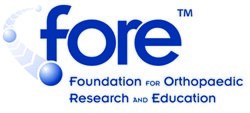Foundation for Orthopaedic Research & Education (FORE)
Over the years, advances in orthopedic medicine have allowed patients with orthopedic problems to maintain active lifestyles by decreasing their pain and increasing their function. However, current treatment approaches are far from perfect, as can be seen in the rates of device failures, revision surgeries, complications, and continued use of narcotics after treatment.

Founded by Florida Orthopaedic Institute surgeons in 1999, the Foundation for Orthopaedic Research and Education (FORE) is a 501(c)(3) non-profit organization created for the sole purpose of addressing these issues by engaging in orthopedic research and education to improve the diagnosis, treatment, and care of all patients with musculoskeletal disorders. While FORE operates independently from Florida Orthopaedic Institute, there is constant collaboration with the surgeons on numerous research and education endeavors.
In addition, FORE focuses on the development and improvement of surgical techniques and instrumentation, medical devices, biomaterials, and rehabilitation protocols—advances that can only be accomplished through a concerted effort by teams of research scientists and orthopedic physicians.
The clinical research department conducts orthopaedic clinical trials in such subspecialties as hand, foot, ankle, knee, hip, spine, elbow, shoulder, and sports medicine.
This orthopaedic outcome-based research includes:
- IDE (Investigational Device Exemption) studies
- IND (Investigational New Drug) studies
- Industry-sponsored studies
- Investigator-initiated studies
- Randomized, controlled trials
- Case studies
- Access to Florida’s largest orthopaedic group
FORE also provides full-service clinical trial management strategies:
- Experimental design/ protocol development
- IRB management
- Patient recruitment
- Data management
- Statistical support and data analysis
- Medical writing of manuscripts and abstracts
- Presentation development
FORE’s Phillip Spiegel Orthopaedic Research Laboratory conducts high quality translational and basic science research that significantly contributes to the knowledge base, resulting in advancements in clinical applications in orthopaedics.
FORE facilitates the collaboration between different subspecialties of biomedical engineers and physicians to perform various biomechanical evaluations including synthetic bone testing, cadaver testing, computer simulations and finite element modeling.
FORE partners with industry, research and educational foundations, and orthopaedic associations and societies to conduct basic science and translational research:
- Investigating how various orthopaedic disease states affect musculoskeletal function
- Developing and biomechanical evaluating of promising new orthopaedic devices and technologies
Completed and published studies demonstrate research expertise in the general area of in vitro biomechanical testing. Projects range from strength testing of various fracture fixation devices in the knee, hip, shoulder, and elbow to kinematic range of motion analysis of human cadaveric lumbar and cervical spine fusion and arthroplasty constructs. The laboratory is also heavily involved in biomechanical projects that further the understanding of total and reverse shoulder arthroplasty, and the resultant effects that these techniques impart on the kinematics and kinetics of the shoulder.
FORE is improving orthopaedic medicine through investigation, innovation and education.
For more information about the Foundation for Orthopaedic Research and Education, visit www.foreonline.org.